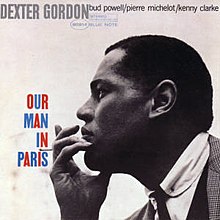| Our Man in Paris | ||||
|---|---|---|---|---|
 | ||||
| Studio album by Dexter Gordon and Bud Powell | ||||
| Released | December 1963 (1963-12) | |||
| Recorded | May 23, 1963 | |||
| Studio | CBS Studios, Paris | |||
| Genre | Jazz | |||
| Length | 38:05 50:03 (reissue) | |||
| Label | Blue Note BLP 4146 | |||
| Producer | Francis Wolff | |||
| Dexter Gordon chronology | ||||
| ||||
| Bud Powell chronology | ||||
| ||||
| Review scores | |
|---|---|
| Source | Rating |
| All About Jazz | |
| Allmusic | |
| The Guardian | |
| The Penguin Guide to Jazz | |
| The Rolling Stone Jazz Record Guide | |
| Encyclopedia of Popular Music | |
Our Man in Paris is a 1963 jazz album by saxophonist Dexter Gordon. The album's title refers to where the recording was made, Gordon (who had moved to Copenhagen a year earlier) teaming up with fellow expatriates Bud Powell and Kenny Clarke, both Parisian residents, and native Parisian Pierre Michelot. Powell, Clarke and Michelot, under the name The Three Bosses, had played together often in Paris since Powell moved there in 1959.
The album was remastered by Rudy Van Gelder in 2003 and released as part of Blue Note's RVG Edition series.
Music
The original intention was for the pianist on the recording to be Kenny Drew and for the music to be new compositions by Gordon. However, the actual pianist used was Bud Powell, who would not play new music, so jazz standards were chosen during the rehearsal. The two tracks added to the CD release were originally issued by Blue Note on Bud Powell's Alternate Takes in 1985.
Critical reception
The Penguin Guide to Jazz gave it a maximum four-star rating and added it to the core collection, commenting that Gordon's playing on "A Night in Tunisia" "is one of his finest performances on record" and concluding that the album is "a classic". The review of the 2003 remastered version in The Guardian was similarly positive, stating that it is "one of the all-time classics".
Marc Davis, writing for All About Jazz, described Gordon's playing on the opening track as "on fire" and Powell's as "sublime". He concluded, "If not in your collection, it should be. Gordon is one of the all-time best boppers, and Paris is arguably his best recording."
Track listing
Original release
| No. | Title | Writer(s) | Length |
|---|---|---|---|
| 1. | "Scrapple from the Apple" | Charlie Parker | 7:22 |
| 2. | "Willow Weep for Me" | Ann Ronell | 8:47 |
| No. | Title | Writer(s) | Length |
|---|---|---|---|
| 1. | "Broadway" |
| 6:44 |
| 2. | "Stairway to the Stars" | 6:57 | |
| 3. | "A Night in Tunisia" | 8:15 |
CD reissue
| No. | Title | Writer(s) | Length |
|---|---|---|---|
| 1. | "Scrapple from the Apple" | Charlie Parker | 7:22 |
| 2. | "Willow Weep for Me" | Ann Ronell | 8:47 |
| 3. | "Broadway" |
| 6:44 |
| 4. | "Stairway to the Stars" | 6:57 | |
| 5. | "A Night in Tunisia" | 8:15 | |
| 6. | "Our Love is Here to Stay" | 5:39 | |
| 7. | "Like Someone in Love" | 6:19 |
Personnel
Musicians
- Dexter Gordon – tenor saxophone (except track 7)
- Bud Powell – piano
- Pierre Michelot – bass
- Kenny Clarke – drums
Production
- Francis Wolff – production and cover photography
- Reid Miles – cover design
- Claude Ermelin – recording engineering
- Ron McMaster – digital transfer engineering
References
- Billboard Dec 28, 1963
- ^ Jazz, All About (2015-07-16). "Dexter Gordon: Dexter Gordon: Our Man in Paris – 1963 album review @ All About Jazz". All About Jazz. Retrieved 2024-09-08.
- Jurek, Thom (2011). "Our Man in Paris - Dexter Gordon | AllMusic". allmusic.com. Retrieved 1 August 2011.
- ^ Fordham, John (September 5, 2003) "Under the bonnet" The Guardian, p. B24.
- ^ Cook, Richard and Morton, Brian (2008) The Penguin Guide to Jazz Recordings (9th ed.), Penguin, p. 581.
- Swenson, J., ed. (1985). The Rolling Stone Jazz Record Guide. USA: Random House/Rolling Stone. p. 87. ISBN 0-394-72643-X.
- Larkin, Colin (2007). Encyclopedia of Popular Music (4th ed.). Oxford University Press. ISBN 978-0195313734.
- Cuscuna, Michael. In Our Man in Paris Blue Note 0777 7 46394 2 2.
External links
- Our Man in Paris at Discogs (list of releases)
This 1960s jazz album-related article is a stub. You can help Misplaced Pages by expanding it. |